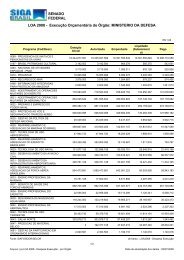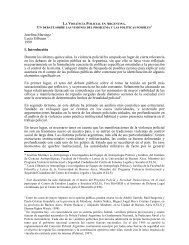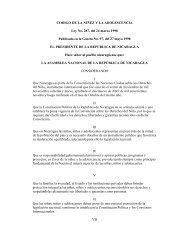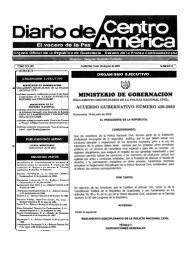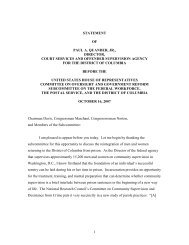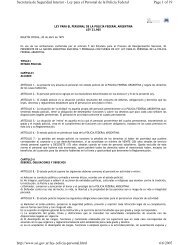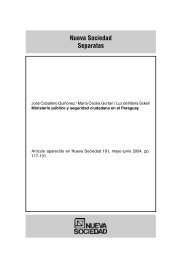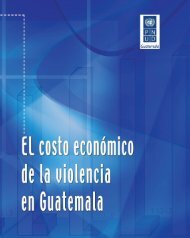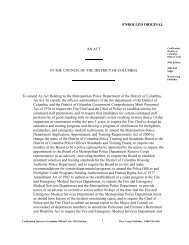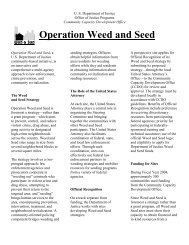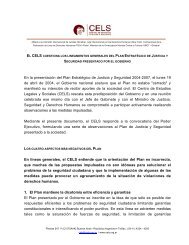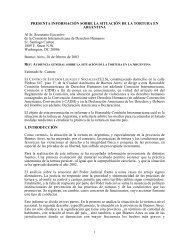Venezuela: The Life and Times of the Party System - Political ...
Venezuela: The Life and Times of the Party System - Political ...
Venezuela: The Life and Times of the Party System - Political ...
You also want an ePaper? Increase the reach of your titles
YUMPU automatically turns print PDFs into web optimized ePapers that Google loves.
shifting set <strong>of</strong> potential partners have made for growing resort to short-term coalitions. This<br />
practice is likely to gain fur<strong>the</strong>r strength from recent electoral reforms that, as noted, enhance <strong>the</strong><br />
ability <strong>of</strong> smaller groups to compete in nonpresidential races.<br />
Electoral Reform <strong>and</strong> <strong>Party</strong> Dynamics in <strong>the</strong> 1980s<br />
During <strong>the</strong> 1980s, <strong>the</strong> political system (<strong>and</strong> in particular, domination by <strong>the</strong> political<br />
parties) came under increasing criticism. Despite many important achievements, particularly<br />
when compared to <strong>the</strong> predemocratic years or to <strong>the</strong> record <strong>of</strong> o<strong>the</strong>r countries in Latin America,<br />
<strong>the</strong> tendency in <strong>the</strong> 1980s <strong>and</strong> early 1990s in <strong>Venezuela</strong> has been to highlight deficiencies ra<strong>the</strong>r<br />
than successes. One criticism has focused on <strong>the</strong> political system’s inability to guarantee a better<br />
st<strong>and</strong>ard <strong>of</strong> living for <strong>Venezuela</strong>’s growing population. Once major threats to regime stability had<br />
been overcome, dem<strong>and</strong>s for greater political <strong>and</strong> especially socioeconomic participation grew<br />
sharper. Failures in this area have eroded <strong>the</strong> legitimacy <strong>of</strong> <strong>the</strong> party system <strong>and</strong> <strong>of</strong> <strong>the</strong><br />
democratic regime as a whole. Appeals to ‘belt tightening’ during <strong>the</strong> country’s present economic<br />
difficulties seem absurd to many, especially in light <strong>of</strong> <strong>the</strong> successive oil-driven economic booms<br />
<strong>of</strong> <strong>the</strong> 1970s <strong>and</strong> 1980s. 1 Corruption is ano<strong>the</strong>r source <strong>of</strong> criticism <strong>and</strong> disenchantment. <strong>The</strong><br />
inability <strong>of</strong> <strong>the</strong> judicial system to guarantee equal treatment <strong>and</strong> to punish <strong>the</strong> public <strong>of</strong>ficials <strong>and</strong><br />
private persons involved in administrative sc<strong>and</strong>als has discredited <strong>the</strong> regime. <strong>Political</strong> parties<br />
have also been widely accused <strong>of</strong> manipulating <strong>the</strong> judicial system to protect <strong>the</strong>ir members <strong>and</strong><br />
supporters. In response to growing critiques <strong>of</strong> <strong>the</strong> party system, debate has turned to <strong>the</strong> need<br />
for electoral <strong>and</strong> more general political reforms that would affect <strong>the</strong> party system, <strong>and</strong> <strong>the</strong> state,<br />
as well as <strong>the</strong> relationships among <strong>the</strong> state, parties, social organizations, <strong>and</strong> individuals.<br />
With respect to <strong>the</strong> electoral system, two somewhat contradictory points can be noted.<br />
Its relative simplicity stimulates <strong>and</strong> facilitates participation both by social organizations <strong>and</strong><br />
individual citizens. <strong>The</strong> act <strong>of</strong> voting is simple, requirements for <strong>the</strong> registration <strong>of</strong> c<strong>and</strong>idates <strong>and</strong><br />
parties are very liberal, <strong>and</strong> voter registration functions smoothly. Parties win seats in Congress<br />
<strong>and</strong> state legislatures with a minimal number <strong>of</strong> votes. Based on <strong>the</strong> principles <strong>of</strong> extending<br />
political rights to <strong>the</strong> entire population <strong>and</strong> <strong>of</strong> including <strong>and</strong> representing <strong>the</strong> maximum possible<br />
1 In <strong>the</strong> 1980s <strong>Venezuela</strong>’s economy entered a serious decline, <strong>and</strong> hopes for improvement in<br />
<strong>the</strong> socioeconomic situation <strong>of</strong> <strong>the</strong> population have been frustrated. <strong>The</strong> combination <strong>of</strong> declining<br />
prices for petroleum, ineffective economic policies, <strong>and</strong> <strong>the</strong> pressure <strong>of</strong> debt service payments<br />
have produced currency devaluation, inflation, <strong>and</strong> a sharp drop in real income. <strong>The</strong> exchange<br />
rate fell from 4.3 bolívares to <strong>the</strong> dollar in February 1983 to over 68 to <strong>the</strong> dollar in early<br />
September 1992. Inflation, which had remained in single digit figures until <strong>the</strong> mid-1970s, rose to<br />
over 80 percent in 1990. This rise has been concentrated in areas like shelter <strong>and</strong> food, with<br />
sharply negative results for <strong>the</strong> living st<strong>and</strong>ards <strong>of</strong> workers <strong>and</strong> marginal groups.



